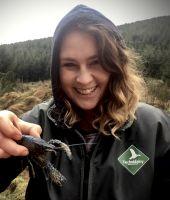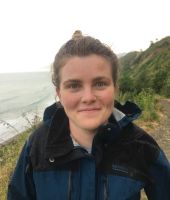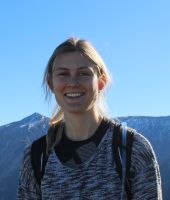
Holly Harris
PhD, submitted 2024
Braided river systems are rare worldwide and considered to have significant natural and cultural values in New Zealand. Holly is aiming to investigate how birds, fish, mammals, and invertebrates interact and connect across terrestrial and aquatic areas in these systems. She is working on the Cass River, in Tekapo, with stable isotopes to determine what a braidplain food web in a (mostly) intact braidplain system looks like. This work aims to enhance our understanding of rivers as highly connected systems that don’t just span an area covered by water in one point in time. It also aims to aid management decisions by identifying trophic connections that could occur on multiple scales and be impacted by changes that cascade into other areas of the system.
- Research interests: Braided rivers, food webs, cross-system subsidies, trophic connections

Ben Crichton
PhD, 2024
Ben’s research seeks to answer the elusive question of whether whitebaiting impacts the population dynamics of harvested kōkopu species and whether closing areas to whitebaiting contributes to species protection and increased production. To achieve this, Ben will monitor banded, shortjaw, and giant kōkopu populations within whitebaited and legally closed waterways on the West Coast of the South Island each month for a year. Using spotlights, the nocturnal kōkopu are caught at night with hand nets and placed in buckets to be measured. Environmental variables, such as pool volume and bank cover, are also likely to affect kōkopu abundance, so these are also measured at each site. This means the effects of whitebaiting can be more precisely evaluated. His research hopes to provide insight into the sustainability of the nationally significant, but highly controversial, whitebait fishery while ensuring that kōkopu and the whitebait fishery are preserved for future generations.
- Research interests: Aquatic ecology, conservation biology, fishery sustainability, freshwater fish, human-mediated impacts

Chris Meijer
PhD, 2024
Chris' research centred on two native fish, kōwaro (Canterbury mudfish) in his MSc and īnanga in his PhD. In both studies, he used a combination of food-web analysis and population surveys to identify how these iconic fishes were responding to local environmental conditions. Key management implications focused the impact of habitat degradation and the need for high quality habitat for both species to thrive. Handouts from these studies are available on figshare. Kōwaro (MSc) handout, Īnanga (PhD) handout.

Channell Thoms
PhD, 2024
There are a number of research projects that have focused on the physical restoration of waterways and habitats, however, there is little known about reintroducing native species back into rehabilitated environments. Reseeding of native species that could potentially assist with stream rehabilitation is the most logical “next step” in stream restoration. Channell’s research focuses on using kākahi, freshwater mussels (Echyridella sp.) to act as a biological tool to assist with waterway restoration efforts. Kākahi are ideal candidates as they perform a number of ecologically important functions in waterways. These functions include acting as bio-engineers which can physically shape environmental habitats; bio-indicators, which can assist with assessment of water quality; and filter feeders, which may help with removal of particulates and contaminants.
- Research interests: kākahi (freshwater mussels), multi-trophic translocations of threatened endemic mahinga kai species into rehabilitated waterways.

Michael Maniel
MSc, 2024
Our understanding of freshwater biodiversity and the current state of these unique ecosystems across the Pacific Islands is limited. For example, the invertebrate communities of freshwater ecosystems in Vanuatu are poorly understood, so we do not know how they are responding to human-induced change. For his thesis, Michael is comparing local freshwater biodiversity between streams across Banks Peninsula to evaluate the impact of land use on the local invertebrate community. More specifically, Michael is looking at the interaction between the pollution-sensitive invertebrates, such as mayflies, stoneflies and caddisflies, and changes to the local environment due to land use, with an aim to link back to the freshwater invertebrate communities of Vanuatu. He aims to combine the information on the Vanuatu freshwater fauna, particularly the freshwater biodiversity, with his fieldwork here on Banks Peninsula to work towards a freshwater biomonitoring plan in Vanuatu.
- Research interests: Conservation biology, benthic invertebrates, water quality, land use and climate change impacts

Inge Martens
MSc, 2023
To overcome the logistical and technical challenges associated with sampling a braided river, Inge will use a new molecular sampling technique, environmental DNA (eDNA). eDNA is an integrative tool that can be used to provide information on both the terrestrial and aquatic diversity present in braided river landscapes. This will be measured at multiple scales to identify the roles that heterogeneity and human-driven alterations have in driving the overall biodiversity in Canterbury’s braided rivers. She aims to address the legitimacy of using eDNA as a biomonitoring tool in braided rivers to assess current biodiversity and potentially future changes. Ultimately, this work will provide novel information that could guide decision making about key but vulnerable habitats, and result in improvements in our understanding of braided river biodiversity.
- Research interests: Braided rivers, environmental DNA, biomonitoring, conservation biology

Elysia Harcombe
MSc, 2023
Droughts are forecast to become increasingly frequent on the east coast of New Zealand’s South Island due to climatic change and increasing water abstraction. However, most knowledge around the effects of drying on aquatic fauna is for charismatic vertebrates such as fish. Elysia’s research hopes to address this by improving knowledge on the effects of droughts on stream invertebrates. Her research will describe how and why aquatic insect communities change as streams start to dry. This will be achieved by studying how invertebrate behaviour (such as drift and emergence) and invertebrate interactions (such as predation and competition) change along a spatial gradient of drying. Elysia will be conducting surveys across six drying streams and using experimental mesocosms which manipulate the interactions between aquatic invertebrates.
- Research interests: Drying streams, macroinvertebrates, community structuring processes, aquatic invertebrate behaviour

Rory Lennox
MSc, 2023
We are already seeing larger, more frequent floods in NZ because of climate change, but we don’t fully know how these floods will affect our native species alongside other pressures. My project aims to explore the relationship between native non-migratory galaxiids, introduced trout and flood disturbance. Using mark and recapture techniques across Arthur’s pass, I am investigating how native non-migratory galaxiid populations are recovering from the May/June 2021 Canterbury floods while in the presence of introduced trout. By doing so, this project can better inform management of our native fish against threats of introduced species and climate change, to ultimately help preserve our native fish in future with climate change predicted to worsen.
- Research interests: Freshwater fish, predator-prey interactions, invasions and non-native species, conservation biology, flow-related disturbances

Aisling Rayne
PhD, 2022
Aisling is using conservation genomics tools to help rehabilitate our freshwater ecosystems for our future generations. For her PhD, she is privileged to work in partnership with an exceptional team including mana whenua, conservation practitioners and primary industry to improve resilience in the declining mahinga kai species kēkēwai/kōura/freshwater crayfish. Together, they are using a combination of genomic and non-genomic information to inform management of kēkēwai (e.g., translocations) to enhance conservation, customary and commercial outcomes. Aisling also loves getting outdoors and working with fellow students and the Ōtautahi community as part of UC’s Student Volunteer Army.

Brittany Earl
MSc, 2022
Brittany researched influences of invasive frogs on pond ecology in the New Zealand high country for her Masters of Science, which she finished in 2022. Specifically, she studied the tadpoles of Litoria ewingii, the brown tree frog, which was introduced from Australia over 150 years ago. This species is prevalent across the country, and she found the tadpoles can reach very high densities very quickly (going up to 100 tadpoles per m2 in a month), and persist across a gradient of pond-permanence and in a variety of environmental factors like pH and pond type. These tadpoles were also found to reduce some pond macroinvertebrates, periphyton, and macrophytes, as well as increasing the suspended algae at high densities. Her thesis can be found in the University of Canterbury library repository, “Life history and impact of non-native brown tree frog, Litoria ewingii, on New Zealand pond ecosystems”, and published paper in Freshwater Biology, 2023, “Invasion of a non-native anuran likely disrupts pond ecosystems”.
Brittany now works for the Department of Conservation as a regional freshwater ranger, coordinating pest fish surveys and other freshwater biosecurity work, and coordinating and carrying out field work for the Nga Ika e Heke program, to secure native migratory fish species (īnanga, tuna, kanakana | whitebait, longfin eels, and lamprey) across the Eastern South Island region (Canterbury).

Kate Hornblow
MSc, 2022
Understanding how biotic filters (i.e. species competition) can shape macroinvertebrate communities in freshwater systems could be important for improving biological restoration. My thesis will focus on the interactions between Potamopyrgus antipodarum, a freshwater snail that can dominate restored Canterbury low land streams, and colonizing mayflies, caddisflies and stoneflies. I will use both in-stream mesocosms and artificial stream systems to identify the mechanisms by which P. antipodarum, at high densities, interacts with other macroinvertebrates. I also hope to identify how increasing P. antipodarum densities affects the interaction strength, and at which density the interaction strength is significant enough that they start to exclude other macroinvertebrates from colonizing and establishing. Subsequently, this density could be used as a guideline for restoration projects, by reducing snail numbers to a certain level, it may facilitate the re-colonization of other macroinvertebrate species.

Jessica Schofield
MSc, 2022
Most streetlights around New Zealand are being converted from high-pressure sodium lamps (HPS) to more energy efficient light emitting diodes (LEDs) by mid 2021. Little is known about the effect of artificial light at night on freshwater environments. Jessica’s research aims to determine the influence of LED lighting on freshwater insect communities. She is particularly interested in how a range of colour temperature LEDs with differing spectral profiles affect freshwater adult insects in the Christchurch and greater Canterbury area. She is also looking into how distance of LED lights from streams affects the attraction of freshwater adult insects to LEDs. Jessica’s research, as part of a larger NIWA project, hopes to improve knowledge of the ecological effects of LED lights at night.
Alumni before 2021
- Dr Issie Barrett, PhD (2021)
- Alex Barclay, MSc (2021)
- Amy van Lindt, BSc (Hons) (2021)
- Dr Katie Collins, PhD (2019)
- Dr Steve Pohe, PhD (2019)
- Dr Justin Pomeranz, PhD (2019)
- Alice West, MSc (2019)
- Bridget White, BSc (Hons) (2019)
- Dr Nixie Boddy, PhD (2018)
- Simon Coats, MSc (2018)
- Dr Kevin Fraley, PhD (2018)
- Dr Brandon Goeller, PhD (2018)
- Tim Green, MSc (2018)
- Roland Eveleens, BSc (Hons) (2017)
- Nicky Glenjarman, MSc (2017)
- Dr Richard White, PhD (2017)
- Jase Eden, MSc (2016)
- Malea Zygadlo, MSc (2016)
- Sophie Hunt, MSc (2015)
- Dr Amanda Klemmer, PhD (2015)
- Tom Swan, MSc (2015)
- Dr Jon Bray, PhD (2014)
- Dr Mark Galatowitsch, PhD (2014)
- Roseanna Gamlen-Greene, BSc (Hons) (2014)
- Dr Elizabeth Graham, PhD (2014)
- Dr Simon Howard, PhD (2014)
- Tom Moore, MSc (2014)
- Dr Danladi Umar, PhD (2014)
- Dr Frank Burdon, PhD (2013)
- Dr Kristy Hogsden, PhD (2013)
- Emma Porter, MSc (2013)
- Karen Renouf, MSc (2013)
- Matt Wallace, MSc (2013)
- Kim Roberts, MSc (2012)
- Kate Schowe, MSc (2012)
- Teresa Burrell, MSc (2011)
- Dr Rebecca Campbell, PhD (2011)
- Laura Drummond, MSc (2011)
- Dr Phil Jellyman, PhD (2011)
- Simon Stewart, MSc (2011)
- Jarred Arthur, MSc (2010)
- Hannah Franklin, MSc (2010)
- Troy Watson, MSc (2010)
- Taryn Wilks, MSc (2010)
- Kati Doehring, MSc (2009)
- Dr Duncan Gray, PhD (2009)
- Justin Kitto, MSc (2009)
- Dr Amy Whitehead, PhD (2009)
- Dr Darragh Woodford, PhD (2009)
- Dr Hamish Greig, PhD (2008)
- Amber Sinton, MSc (2008)
- Hannah Wood, MSc (2008)
- Dr Michelle Greenwood, PhD (2007)
- Rebecca Eivers, MSc (2006)
- Iain Fraser, MSc (2006)
- Annabel Barnden, MSc (2005)
- Dr Hans Eikaas, PhD (2005)
- Paul Morris, MSc (2005)
- Dr Leanne O’Brien, PhD (2005)
- Sarah Rickard, MSc (2005)
- Tanya Blakely, BSc (Hons) (2003)
- Alice Bradley, MSc (2003)
- Nicholas Dunn, MSc (Hons) (2003)
- Jane Goodman, MSc (Hons) (2002)
- Rachel McNabb, MSc (Hons) (2002)
- Christopher Bell, MSc (2001)
- Bruce Digby, MSc (2001)
- Marty Bonnett, MSc (2000)
- Kelly Drinnan, MSc (Hons) (2000)
- Shellie McMurtie, MSc (Hons) (2000)

